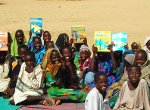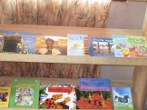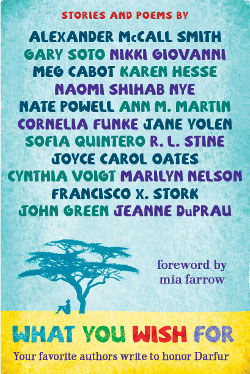
Education in Bredjing Refugee Camp: Self-Study for Teachers
In this second special report about education in Bredjing Camp, Chad, our on-the-ground partner Anne Goddard of CORD explores the self-study groups by which refugee teachers aim to improve themselves and provide a better education for their students. They are dreaming big, putting their hopes for the future in education. Your donations will help make their dreams come true.
I am impressed; very impressed. I am sitting with nine men whose ages range from 18 to 35 and who have been forced to leave their country because the Janjaweed militia violently and brutally killed their families and friends, having every intention of doing the same to them. One could understand if these people with whom I am sitting were talking of wreaking revenge, perhaps telling me of their plans to join one of the rebel groups that operate in Darfur, Sudan so that they can forcibly take back their towns and villages.
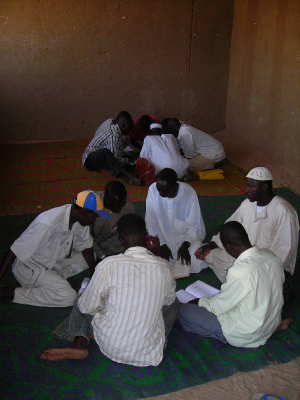 What they are telling me, however, is that after they have finished their teaching in the schools in Bredjing Refugee Camp, they go home to read books. Three times a week, for three hours in the afternoon they meet together to discuss what they have read and work out the information in the books that is unclear, so that the level of their education is increased. They have organised the subjects that they study into a timetable and read a chapter at home before getting together in groups of six people to discuss what they have learned. The topics which demand the most attention are maths, science and Arabic, which itself requires a vast knowledge of mountains of intricate grammar rules.
What they are telling me, however, is that after they have finished their teaching in the schools in Bredjing Refugee Camp, they go home to read books. Three times a week, for three hours in the afternoon they meet together to discuss what they have read and work out the information in the books that is unclear, so that the level of their education is increased. They have organised the subjects that they study into a timetable and read a chapter at home before getting together in groups of six people to discuss what they have learned. The topics which demand the most attention are maths, science and Arabic, which itself requires a vast knowledge of mountains of intricate grammar rules.
It is not just these teachers who are studying. In each of the seven schools in Bredjing Camp, there are around five groups who regularly meet, using the same format. They are CORD's primary and pre-school teachers, along with some students who are in the final two years of primary school. Their desire is to gain as much education as possible and to somehow make a brighter future for themselves. However, through improving their own standards, they are by default helping the students in the classes in which they teach.
I first came to work in Bredjing and Treguine camps in August 2005. The schools had been open for eight months and were running effectively, staffed mainly by young men who were not teachers by profession, but who had a better educational standard than everyone else. In fact, we still have only 4 out of 142 primary teachers who have been to university. As the months passed, we were able to find people to give training courses, which helped build the teachers’ confidence in their ability to work effectively in the classroom. However, the worry in the back of their minds was constantly that the students were approaching their own standard of education and they repeatedly asked us if we would find trainers in all of the subjects on their curriculum. It was clear to me that there would never be this opportunity and that we would all have to walk a road less travelled.
When I worked in Khartoum, Sudan with the organisation, House of Learning, part of the Swedish Free Mission, the method of training was based upon the Swedish system known as folkbildning. This is basically small group interactive learning that stemmed from the time of the Swedish industrial revolution when those who were trapped in poverty in the cities educated themselves by reading books together and discussing what they had learned. So I lifted the same idea and with the help of my Chadian colleague, Yacoub trained a small group of primary teachers in the same skills of reading a book and increasing the collective educational standard of the group through discussion. It was certainly the most boring course I have ever taught, but almost immediately those primary teachers passed on the knowledge and the pre-school teachers were soon asking for the same course from Yacoub. We bought some books from the market in Abéché and the Sudanese did the rest.
So now I am sitting here with nine enthusiastic men who are telling me that all they want to do is to get to university; any university in the world. They will learn another language (many are already trying to improve their English) and will live in new and unknown cultures just to give themselves and their communities the chance of a better future.
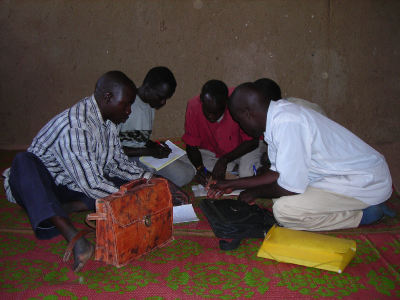 Mohamed Juma (wearing a red shirt in the photo at left) teaches maths in primary as well as the part-time secondary schools. Because maths is a weak subject, he is much in demand. However, his dream is to study medicine and be a doctor – two others of this group have the same ambition. They ask me if I can provide books on medicine, as well as the subjects that are taught in the schools. Two would like to be engineers so that they can construct new buildings in their communities. The others would like to study economics, geology, politics and journalism.
Mohamed Juma (wearing a red shirt in the photo at left) teaches maths in primary as well as the part-time secondary schools. Because maths is a weak subject, he is much in demand. However, his dream is to study medicine and be a doctor – two others of this group have the same ambition. They ask me if I can provide books on medicine, as well as the subjects that are taught in the schools. Two would like to be engineers so that they can construct new buildings in their communities. The others would like to study economics, geology, politics and journalism.
I cannot fault their enthusiasm, but my heart is heavy as we sit together and dream big dreams. For those who have completed their secondary education and have the Sudan Certificate that grants access to Sudanese universities, many have had to leave their documents in Sudan because of the risk of losing them – anyone found with such documents at the border will have them taken away and destroyed. So such precious papers are hidden in a place that is hoped to be secure enough for future access. But of course, the risks of retrieving them are great, even if the haven has proven to be safe.
It is my personal conviction that those who are educated and motivated will succeed in the end. They will certainly enjoy a better quality of life than those who are not. However, I still feel that my job is incomplete. The refugees from Darfur living in Bredjing Camp do not need a passport or a visa to study in Sudan. While it may not be possible for them to study in Khartoum, the University of Juba in southern Sudan may be a viable alternative. If they were able to accommodate those who cannot access their documents and set a fair entrance exam that we can monitor as honestly invigilated and marked, perhaps these teachers do have a chance of a university education after all. It is a contact that I am still trying to make, but for those who have walked this road less travelled, it will make all the difference.
Anne Goddard
Programme Manager for Education in Bredjing & Treguine Camps
Hadjer Hadid, Chad
March 2008
